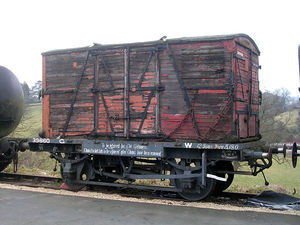Difference between revisions of "GWR Goods Container A890"
(add links) |
(additional info and history) |
||
| Line 1: | Line 1: | ||
| − | [[File:GWR 39860 'Conflat' Container Wagon.jpg|thumb| | + | [[File:GWR 39860 'Conflat' Container Wagon.jpg|thumb|300px|right|”TypeB” Container BR 49408B mounted on GWR 'Conflat' Container Wagon 39860]] |
| − | + | The GWR began to experiment with container transport in the late 1920s, and by the outbreak of World War Two had built around 2,150 containers. The container was essentially a van body which could be carried by a 'Conflat' Wagon such as [[GWR 39860 'Conflat' Container Wagon | GWR 39860]] and also by road transport, without the need to unlock the container or remove goods from it during transhipment. They were therefore used mainly for manufactured goods of high value or commodities which needed to be protected from the weather.<ref name=ABT>[[Bibliography#Other References|Atkins, Beard & Tourret (2013)]] pp. 513-515</ref> | |
| + | |||
| + | ==History== | ||
| + | GWR A890 was built in October 1931 to Diagram A1. It had had external dimensions of 7ft 2½in length x 6ft 2in width x 7ft 2½in height with a wood plank body and a 2½ ton capacity. The "Type A" small covered containers were generally between 7ft – 8ft in length, approximately half the size of the "Type B" seen in the photograph above, meaning two could be carried on one wagon.<ref name=ABT/> | ||
| + | |||
| + | ==Preservation== | ||
| + | A890 was donated to the [[Friends of Kidderminster Town Station]] in 2013 and has since been fully restored and repainted in its original livery of dark grey body with white lettering.<ref>Restoration of GWR Container A890 in the Friends of Kidderminster Town Station magazine [http://www.kfriends.org.uk/magazine/container.htm Part 1], [http://www.kfriends.org.uk/magazine/container1.htm Part 2], [http://www.kfriends.org.uk/magazine/container2.htm Part 3]</ref> | ||
==See also== | ==See also== | ||
| Line 7: | Line 13: | ||
==References== | ==References== | ||
| − | + | <references/> | |
| − | |||
==Links== | ==Links== | ||
| − | [http://www.kfriends.org.uk/ Friends of Kidderminster Town Station web site] | + | *[http://www.kfriends.org.uk/ Friends of Kidderminster Town Station web site] |
| + | *[http://www.kfriends.org.uk/projects/container.htm GWR Container on www.kfriends.org.uk] | ||
Revision as of 10:26, 19 August 2018
The GWRGreat Western Railway began to experiment with container transport in the late 1920s, and by the outbreak of World War Two had built around 2,150 containers. The container was essentially a van body which could be carried by a 'ConflatGWR telegraphic code signifying a flat wagon for containers' Wagon such as GWR 39860 and also by road transport, without the need to unlock the container or remove goods from it during transhipment. They were therefore used mainly for manufactured goods of high value or commodities which needed to be protected from the weather.[1]
Contents
History
GWRGreat Western Railway A890 was built in October 1931 to Diagram A1. It had had external dimensions of 7ft 2½in length x 6ft 2in width x 7ft 2½in height with a wood plank body and a 2½ ton capacity. The "Type A" small covered containers were generally between 7ft – 8ft in length, approximately half the size of the "Type B" seen in the photograph above, meaning two could be carried on one wagon.[1]
Preservation
A890 was donated to the Friends of Kidderminster Town Station in 2013 and has since been fully restored and repainted in its original livery of dark grey body with white lettering.[2]
See also
References
- ↑ 1.0 1.1 Atkins, Beard & Tourret (2013) pp. 513-515
- ↑ Restoration of GWRGreat Western Railway Container A890 in the Friends of Kidderminster Town Station magazine Part 1, Part 2, Part 3
